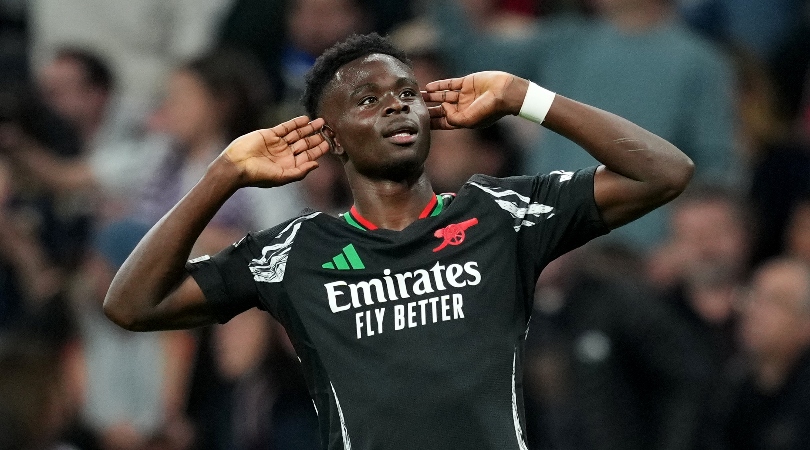Wales at Euro 2020: How do they follow their sensational showing of Euro 2016?
Another run to the semi-finals at Euro 2020 won't be easy for Wales, but they are still reaping the rewards of their history-making performance at Euro 2016
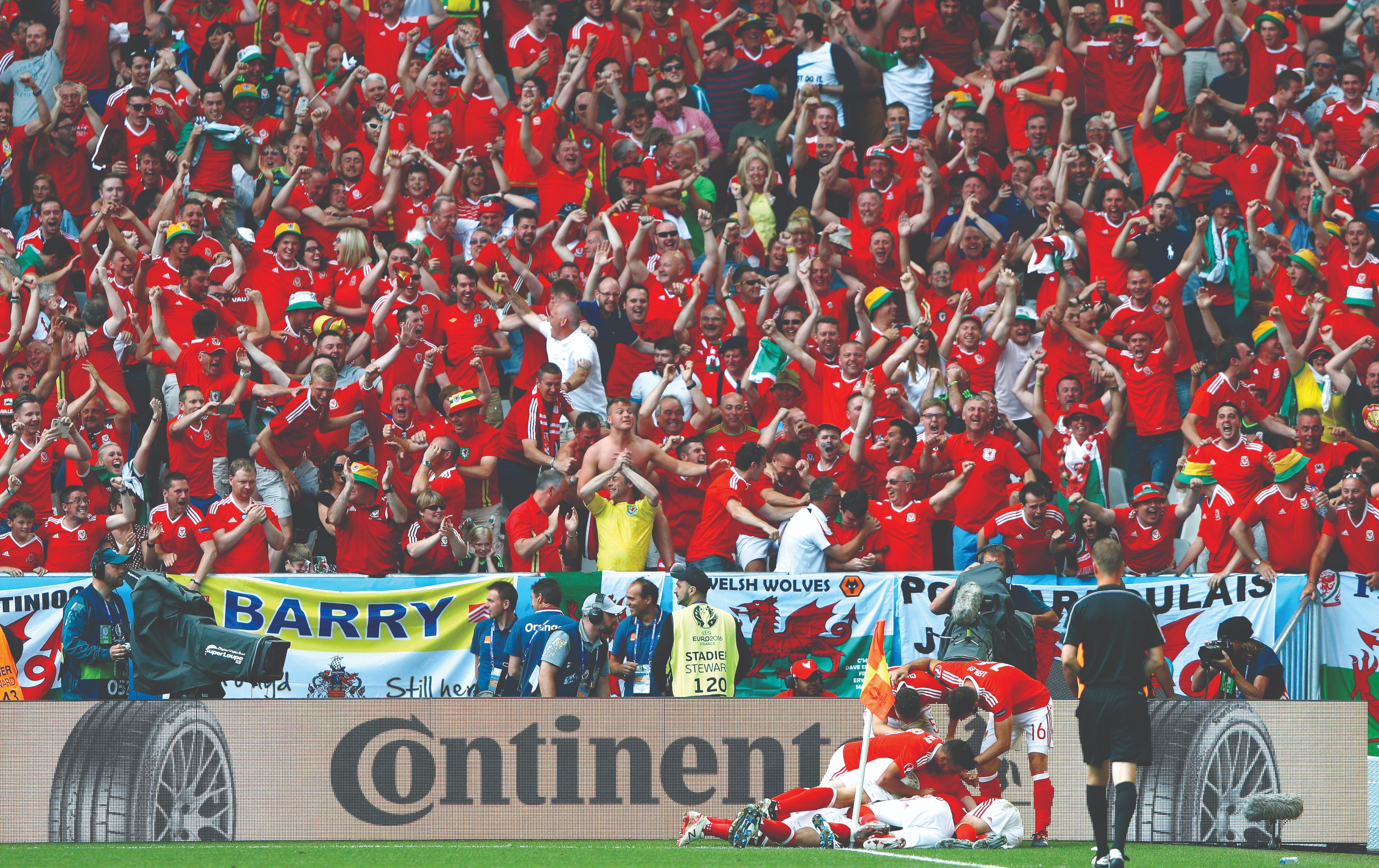
This feature on Wales is from the Euro 2020 preview issue of FourFourTwo. Subscribe now and never miss an issue!
The welcome home was some spectacle. Dazed Welsh stars walked through Bute Park, reflecting on a month so magical it felt fictional, then emerged from Cardiff Castle to find it had been besieged by an army – not of warriors but fans, waving flags rather than swords. It was no less surprising.
“We were in a bubble in France,” Aaron Ramsey tells FourFourTwo. “My family and friends said, ‘You don’t know what it’s like back home – it’s going absolutely mental’. Coming home, we saw people lined up along the streets. We got closer to Cardiff and there were even more. About a quarter of a million turned up. It was unbelievable.”
As a pair of open-top buses crawled through a sea of red in Wales’ capital, one thought crystallised the feeling of an entire nation.
Could it ever get better than this?
Let’s begin at the beginning. Wales’ Euro 2016 adventure started with a slice of fortune, preventing a bleak humiliation that would have ended their momentum, confidence and qualifying hopes immediately.
ALSO READ
Get FourFourTwo Newsletter
The best features, fun and footballing quizzes, straight to your inbox every week.
See the full Wales Euro 2020 squad – as well as a profile on the team.
Wales Euro 2020 fixtures: Who do they play and when?
Who is Wales’ manager? Everything you need to know about Robert Page
Who is Wales captain, Gareth Bale?
On a horrendous rubber-crumb pitch, they were drawing late on against Andorra when Gareth Bale blasted a free-kick straight at the goalkeeper. The referee ordered a retake. Bale blasted it into the net, cue an unlikely pitch invasion calmed by Bale himself, but most crucially: a 2-1 win.
Cue, too, an extraordinary qualifying campaign. Wales kept seven clean sheets in their next nine games, drew in Brussels and beat Belgium 1-0 at home to reach their first ever European Championship. Their manager’s last job had been in the Greek second tier.
Chris Coleman had answered his nation’s call in the worst circumstances imaginable. The first question at his January 2012 unveiling was, “Nobody really wants to be here today, do they?” His response: “No. Least of all, me.”
His predecessor was a young manager who, within nine months, had refreshed the national setup and taken Wales 72 places up FIFA’s rankings. He was a legendary former player. He was Coleman’s friend. But in November 2011, Gary Speed had taken his own life, and as unthinkable as it sounded, Welsh football had to pick itself up.
It wasn’t easy. Wales lost Coleman’s first five matches, with their only goal coming in a 6-1 defeat to Serbia, and dropped to their lowest ever ranking of 117th. The 2014 World Cup passed them by. Then came shoots of hope, and a new defensive resilience, and a thumping win in Israel, and Coleman’s sweaty lucky jacket, and Gareth Bale, and Aaron Ramsey, and, and, and… qualification. And suddenly it was Bordeaux, June 2016, with 24,000 Welsh supporters belting out the national anthem.
“It was better than I could have imagined,” says Elis James: Wales fan, comedian and broadcaster (in that order). “My favourite moment of Euro 2016 was walking to that ground, thinking, ‘Crikey – there’s thousands of us’. And so popular with the locals, too. To combine that with a win… I know cosmically the world doesn’t work like this, but it did feel as if God had realised what we’d been through in the ’90s.”
“The build-up was unbelievable,” midfielder Joe Ledley tells FFT. “There weren’t many hotels around us, but somehow there were thousands of red shirts outside, in the pub. We’d go for a walk and they were cheering.”
The travelling support was dubbed ‘the Red Wall’. “The Welsh are numerous, noisy, sometimes a bit unruly but generally peaceful,” wrote L’Équipe, calling the fans “magnificent” before adding, with coded reference to English hooligans in Marseille: “It seems they hold their beer better than others.” They brought a contagious joy.
“I saw Welsh fans give a guard of honour for a couple that had just got married,” says Elis, laughing. “It was so good-natured.”
Like every sporting summer, it also had its own soundtrack. Around 20 Euro 2016 songs were recorded by Welsh artists; Manic Street Preachers gave the official charity single historical context and a big chorus; The Barry Horns, football’s only popular brass band, went Europop with This Is Wales; Super Furry Animals – who 20 years earlier had watched horror-struck from the stands as Wales lost 7-1 in Rotterdam – released their first single in seven years, then incorporated terrace chants in their fan-packed festival set in Toulouse two nights before Wales played Russia there. And there was Zombie Nation, the team’s anthem since November 2014, when a 0-0 draw with Belgium gave belief to Welsh supporters and players alike while an oblivious DJ played a 1999 techno smash that’s actually called Kernkraft 400.
Not that the Land of Song needs help. “The anthem in Bordeaux is easily my favourite memory,” says Mark Evans, FAW Head of International Affairs, cult hero and “fashion icon in the Welsh camp”, according to Ledley. “You could feel the words in the air, rising out of the stadium,” Evans tells FFT. “Seconds before kick-off, Chris [Coleman] whispered into my ear: ‘Enjoy it’.”

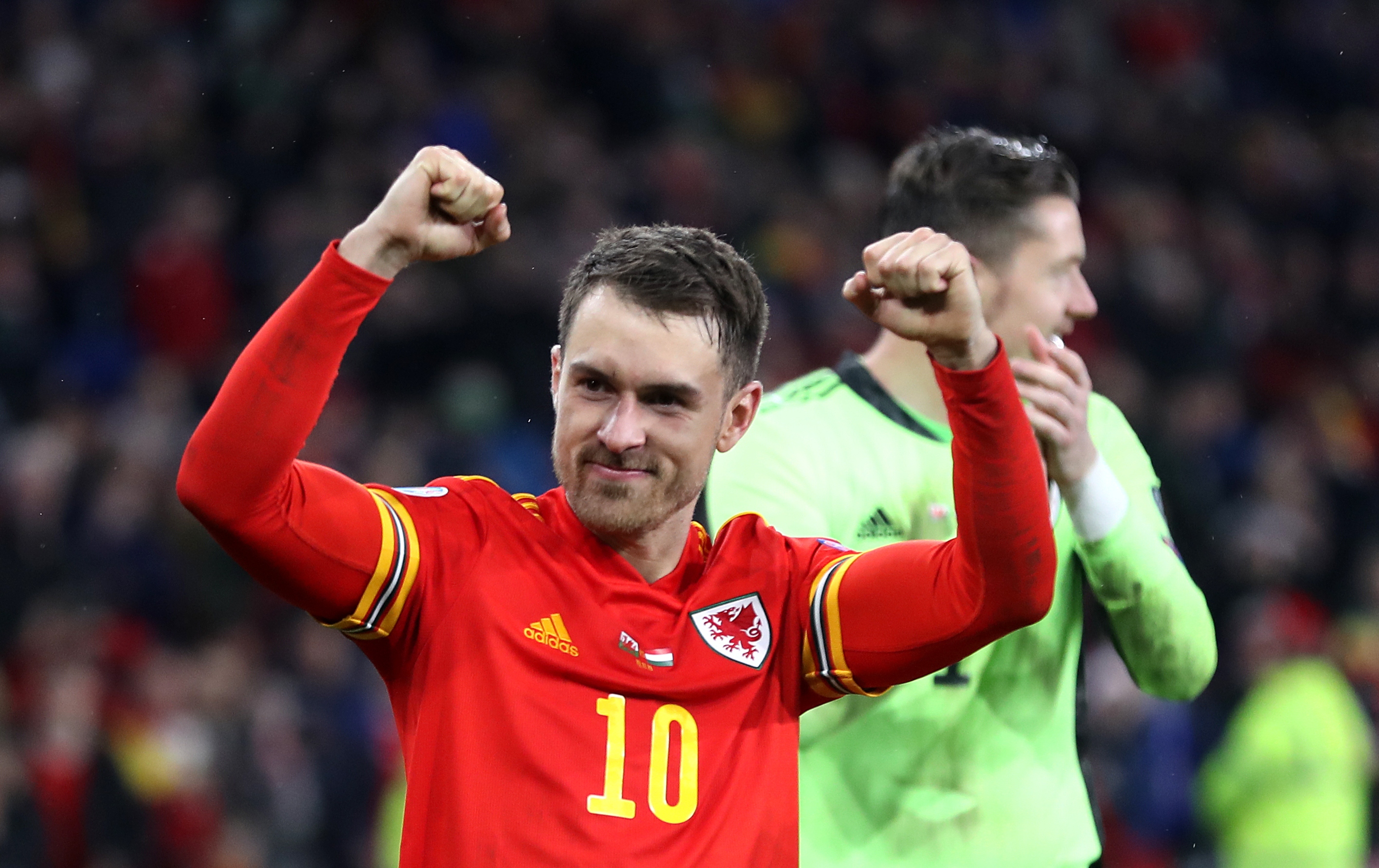
Expectations were healthily low. Good – because after 150 seconds, Slovakia’s Marek Hamsik strolled past panicking defenders. “What a goa- oh!” cried the BBC’s Steve Wilson, as a sliding Ben Davies appeared. “Honestly, Ben saved the game,” continues Ledley. Conceding that early would have shattered Wales. Instead, Bale converted a free-kick earned by Jonny Williams (as predicted in FFT’s tournament preview).
Slovakia’s equaliser prompted a sub that shouldn’t have been possible. Ledley had broken his leg 35 days previously, yet there he was at a pivotal moment. “I was so emotional,” he recalls. “I’d thought it was over. Nobody thought I’d make it. Getting fit was an unbelievable achievement – I was just gutted I didn’t start!”
He nonetheless found his former Cardiff team-mate Ramsey with a line-breaking pass, Ramsey found Hal Robson-Kanu, and Robson-Kanu… “Scuffed it in,” chuckles Ledley. Playing their first tournament game in 58 years, Wales had won.
“I’ve watched every tournament going back to 1990,” explains Elis. “I thought, ‘I’m no longer choosing a team at random to support because we haven’t qualified. We have qualified. And I’m here’. And it was everything I’d always wanted.”
If things were a blur, Matchday Two brought things into focus. Welsh fans had painted Bordeaux red and would dwarf Russia’s support in Toulouse, but in tiny Lens, its population smaller than the Cardiff City Stadium’s capacity, they were outnumbered. England had arrived, bloodied by Russians and licking their wounds.
Despite leading through yet another Bale free-kick, Wales looked nervous and England prevailed with two scrambled goals, one in stoppage time. Chris Gunter gave the Welsh end a now-famous gesture: ‘chin up’. What frustrated Coleman’s charges was that they hadn’t expressed themselves. In the low evening sun of Toulouse, that changed.
“If I could relive any game,” reflects Elis, “it’d be Russia. Everything we’d threatened to do under Coleman happened in the space of 90 minutes. That night felt very filmic.” Or, in Ramsey’s words, “We battered them.”
He scored from Joe Allen’s superb turn and pass. Neil Taylor made it 2-0 on 20 minutes with his first goal since Wrexham vs Grays Athletic in 2010 (he hasn’t scored since, making his tally one goal in his last 329 games). Wales put on a show: olés greeted a 40-pass move involving every player, Bale added a third goal, and Gunter told Coleman mid-game, “Enjoy this, gaffer, because it doesn’t happen often.” The party’s second wind – that late guest, arriving crate in hand – came with the news that England’s draw with Slovakia made Wales group winners.
It made for an unexpected last-16 clash. Parisians must have felt the Parc des Princes was hosting paupers, as Wales and Northern Ireland stifled each other in stifling heat.
“It was the first time we’d been favourites,” Ramsey tells FFT. “We had to be patient and switched on defensively, to not give them any counter-attacks or free-kicks. Eventually we had chances and took one.” Or more accurately, Gareth McAuley did it for them.
And so to Lille, on the Belgian border, for a quarter-final against... Belgium. They had failed to beat Wales in 2013, 2014 and 2015, but in 2016, the Red Devils quickly showed why FIFA rated them Europe’s best team. They raced ahead like the great Belgian cyclists who inspired their lush away kit, forcing a new Red Wall into desperate blocks. Then they went 1-0 up courtesy of a corker from Radja Nainggolan, whose mistake in Cardiff had given Wales a qualifying win. He awoke a sleeping dragon.
In Coleman’s words, Wales “bossed” the next 35 minutes. Thibaut Courtois saved superbly from Taylor. Taylor! Again! Personally affronted, Ashley Williams equalised and knocked half of Wales’ entourage to the floor in the ensuing touchline pandemonium. After half-time, Belgium took control – but on 55 minutes, something remarkable happened.
You know Robson-Kanu’s goal. You know his Cruyff turn took out three Belgians, and his calm finish a fourth. We forget Ramsey’s expert run onto a perfect floated pass, and his three sublime touches to control the ball, shift it and – “I just thought, ‘If I can get it into him, he may lay it off to somebody” – clip a cross infield. Bale, to Ramsey, to Robson-Kanu: No.11, to 10, to 9. And now the minutes were counting down.
Eden Hazard threatened, Marouane Fellaini afro-ed wide and Nainggolan was denied a penalty. Then, on 85 minutes, Gunter was by the Belgian corner flag. Despite Coleman’s exhortation, “Don’t cross that f**king ball, Christopher”, he crossed that flipping ball. Sam Vokes leapt above Toby Alderweireld to flick an unstoppable header past Courtois. The knockout blow. Belgium weren’t getting up. “We’d give anything to relive those five minutes,” said Gunter later.
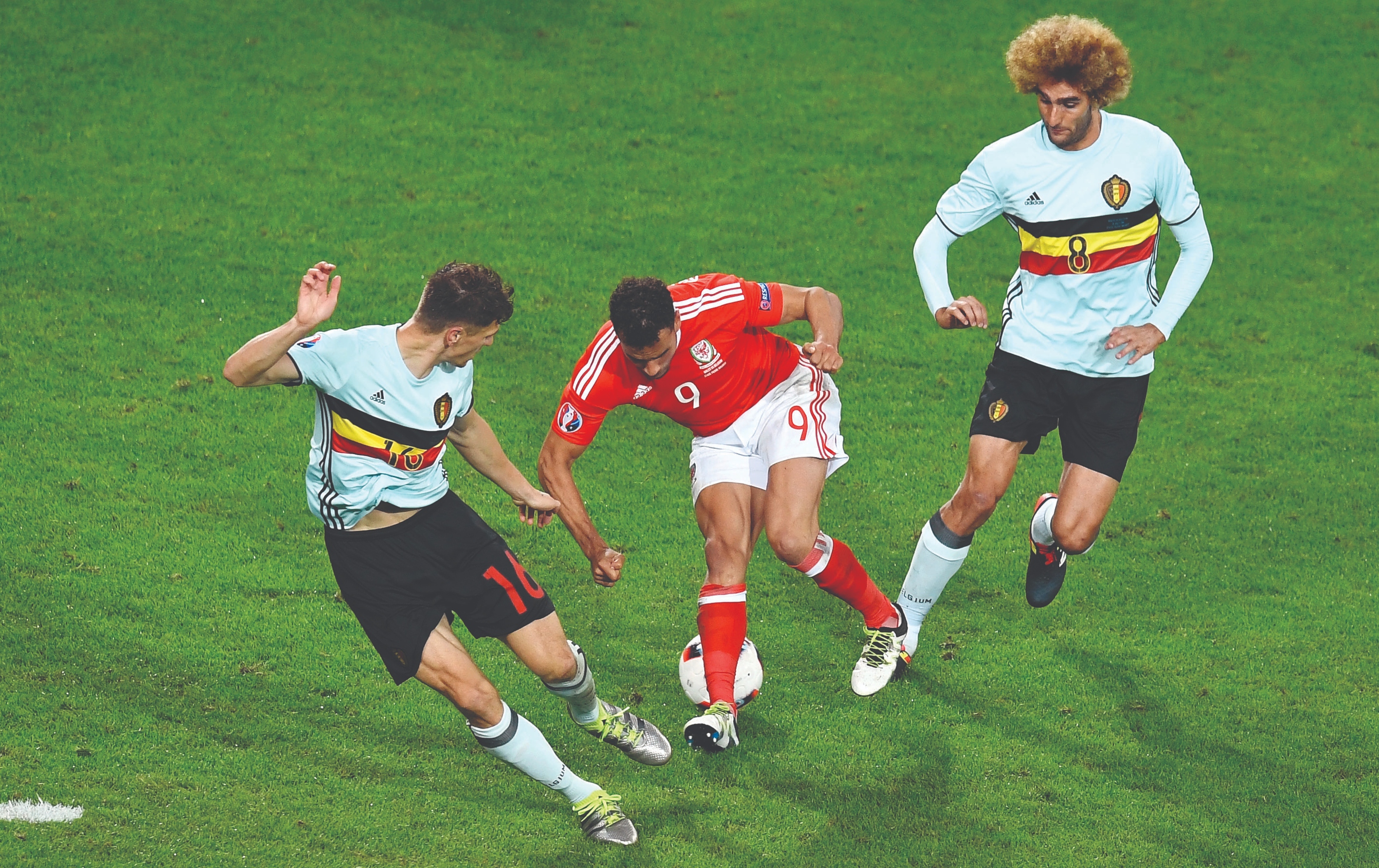
It was a pulsating quarter-final; a true classic that could have been won by either team. Importantly – impossibly – that team was Wales, Euro 2016 semi-finalists. The next day, they went for an ice cream.
Their dream ended in Lyon, at the feet of a towering Cristiano Ronaldo. Two days later came the bus tour. “To feel that energy from your fellow Welshmen, who were so instrumental in us qualifying, was amazing,” says Ramsey. “We’d achieved it together.”
Wales didn’t qualify for the 2018 World Cup. Though the campaign began with an unusually clinical 4-0 dismissal of Moldova, they became sloppy, leads being squandered against Austria, Georgia and Serbia (twice).
But there were some amazing moments. Ben Woodburn, 17, struck a winner on debut precisely as supporters concluded a loud, long and lifting rendition of the anthem. Three days later, he saved Wales in Moldova by brilliantly setting up Robson-Kanu, whose insistence on scoring exclusively important goals may explain why he has five in 46 caps.
However, on a painful night, Wales lost a bruising must-win qualifier to Ireland. “We absolutely dominated them,” says Ledley, perhaps generously, “but just couldn’t get the ball in the net. We were devastated.”
It was an opportunity missed. And yet, as Elis explains, “It didn’t feel like a watershed moment, like Romania in 1993 did, or like Scotland in ’85 did, or Scotland in ’77, or Germany in ’91, or Russia in 2003. Those qualification campaigns really felt like the last-chance saloon. Those big games often came right at the end of a cycle for our best players, so we were always running out of time.” Not so in 2017.
Then Coleman resigned. Ten months after leading Wales in a European Championship semi-final, he moved to Sunderland at the bottom of a different Championship, with one win in 17. Well, why not?
First, though, he showed Wales a glimpse of their future. The previous week’s friendly at the Stade de France – a parallel-universe Euro 2016 Final – gave travelling fans three enduring memories: an 18-year-old Kylian Mbappe running riot; Gunter having a shot; and, after an hour, the sight of Woodburn (aged 18) on the touchline alongside the debuting pair of David Brooks (20) and Ethan Ampadu (17), awaiting a triple substitution.
Coleman’s successor was Ryan Giggs. Some supporters were excited. Many more asked why a first-time manager (four caretaker games notwithstanding) was being entrusted with this once-in-a-generation squad at a crucial stage of its evolution.
Also, it was Giggs. Most fans outside Wales can’t appreciate why most fans inside Wales can’t appreciate Giggs. It dates from his playing days, long before off-field scandals, and the froth boils down to questions over commitment. That’s something a football fan feels within, like a Gwynedd wind rattling your bones – but numbers help. Giggs made his Wales debut in 1991, and played his first Wales friendly in 2000. He made his final Wales appearance in 2007, and his final Manchester United appearance in 2014. He quit international football only to return for the controversial Team GB in 2012. In all, Giggs played in 57 per cent of Wales matches between his first cap and his last, and in 37 per cent from his first cap to his professional retirement.
Ironically, his first managerial assignment was a friendly tournament: the China Cup. A 6-0 victory over the hosts made Bale his country’s all-time leading scorer, before defeat to Uruguay. Next, ‘Mexico vs Whales’, as California’s Rose Bowl proudly declared, gave youngsters with only Checkatrade Trophy experience a chance to make their international debut in front of 82,300 fans – 82,000 of them cheering Mexico. Eleven new players were capped across Coleman’s final two matches and Giggs’ first three.
His first competitive match was a dream. Although Ireland’s subsequent failures have undermined the result, like a defeated online FIFA opponent saying at full-time that he’d just been making a sandwich but he’s back now, Wales were genuinely excellent in their Nations League bow – young, electric and 4-0 up at the hour mark. This was it.
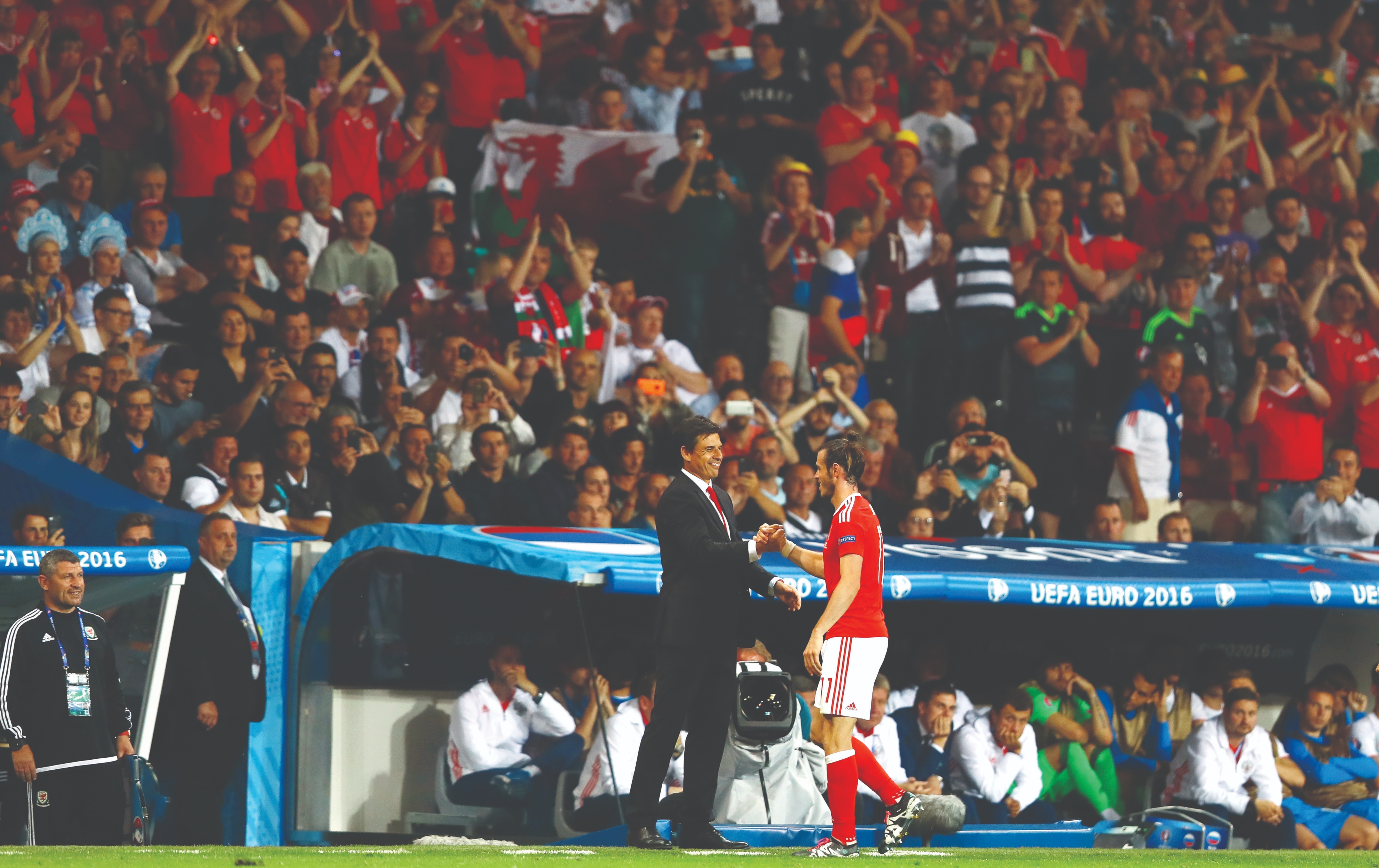
A year later to the day, hour and minute, Wales were drawing 1-1 at home with Azerbaijan, needing a late Bale goal to rescue their Euro 2020 campaign. They had already lost two qualifiers, as well as twice to Denmark in the Nations League, and in friendlies against Albania and Spain: the latter, a 4-1 thumping in a rare – and doomed – appearance at the Millennium Stadium.
It had all gone very wrong.
The messiah was, unexpectedly, a giant. “We had this glut of talent on the wings, with no one for them to cross to,” says Elis James. “Suddenly there’s this 6ft 5in striker who was playing non-league during the last Euros, and he’s good with his feet.”
Even with Bale, Brooks, Daniel James, Harry Wilson and more, Wales struggled. Kieffer Moore, 27, arrived in 2019 and was instantly undroppable. He kept the ball; he created space; he scored. He was, literally, massive.
Wales were changing. The team battled to another must-win qualifying finale but this time, Ramsey’s brace sealed a Euro 2020 place. Despite losing Giggs to an ongoing police investigation, Wales scrapped through another Nations League campaign, letting in one goal in six games. When 2022 World Cup qualifiers rolled around, Wales finally lost to Belgium – albeit having led through a breathtaking team goal – but downed the in-form Czech Republic, with three players making last-man tackles and titchy Dan James scoring a header. With four late winners in eight competitive matches, Wales kept finding a way.
The squad’s bond is strong; FAW man Mark Evans says it was “the most important thing of all” at Euro 2016. Mates who had played together for years “had a laugh”, in Ledley’s words. They unwound (“No drinking in the week, but a few beers after”), danced (“We had some good movers”) and compared beards (“Mark copied me!”). No wonder fans could relate – players were fans themselves. A teenage Harry Wilson attended Euro 2016 in a bucket hat and a match-worn U21 shirt, accompanied by his mum. “It’s like 11 men were plucked from the Canton Stand and asked to play for their country,” says Elis. “The home atmosphere is better than ever.”
Recent success seems sustainable, and this dynamic is one reason why. There’s increasing interest in the youth teams, including a first U18 group since 2000, as well as the women’s team, who were one game from reaching the 2019 World Cup.
Wales is evolving as a country; football is at the heart of it. “Independent football nation” was a chant; now it’s a movement, led by fans. Welsh is, says Duolingo, the fastest-growing language in the UK, despite Asia’s influence and the traditional pull of romance languages. It’s already spoken by the Red Wall’s hefty North Walian contingent.
The FAW’s coaching setup is much-envied and oversubscribed despite the regrettable departure of Osian Roberts, the enormously influential technical director and assistant manager. UEFA Pro Licence graduates include Roberto Martinez, Mikel Arteta, Thierry Henry, Patrick Vieira and plenty of Welsh coaches.
Wrexham’s Racecourse Ground hosted a recent friendly, so remains the oldest active international football ground. Off and on the pitch, where the team is increasingly flexible – Wilson, half Moore’s size, may play No.9 at Euro 2020 – Wales have a future. The nation’s only limit is its own ambition.
But maybe we’re getting a little ahead of ourselves. Right now, Wales are in another European Championship. While it shouldn’t be their last one, they’ll play as if it is. Then, perhaps they can ask the question again: how do you follow that?
This article first appeared in the June 2021 issue of FourFourTwo
Subscribe to FourFourTwo today and get a free Euro 96 shirt!
NOW READ
EURO 2020 SQUADS: EVERY CONFIRMED TEAM FOR THE 2021 TOURNAMENT
EURO 2020 GROUPS: WHO'S PLAYING WHO IN THE FIRST ROUND?
EUROPEAN CHAMPIONSHIP RECORDS: TOP SCORERS, MOST WINS, ATTENDANCES AND MORE
Huw was on the FourFourTwo staff from 2009 to 2015, ultimately as the magazine's Managing Editor, before becoming a freelancer and moving to Wales. As a writer, editor and tragic statto, he still contributes regularly to FFT in print and online, though as a match-going #WalesAway fan, he left a small chunk of his brain on one of many bus journeys across France in 2016.
